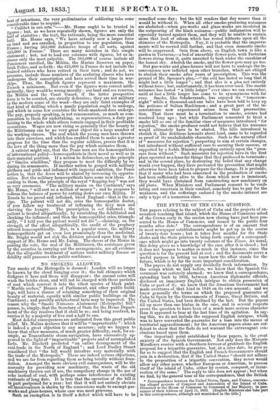NO SMOKING ALLOWED.
THE smoke of the Metropolis is doomed : London will no longer be known by the cloud hanging over it ; the tall ehimnies which disfigure it here and there will disappear ; the annual rains will wash the bricks clean, and will not be charged with those particles of soot which convert it into the vilest species of black paint. " Marble arches," Houses of Parliament, and other public build- ings, will have a chance of retaining something of their original beauty of material, equally with similar public buildings on the Continent ; and possibly architectural taste may be improved. The reason why the "Smoke Nuisance Abatement (Metropolis) Bill" passes, is, simply, that the Secretary of State for the Home Depart- ment of the day resolves that it shall be so ; and being resolved, he carries it by a majority of five and a half to one.
Most doleful consequences are anticipated from this great public relief. Mr. Malins declares that it will be " impracticable " : which is indeed a great objection to any measure ; only we happen to laiow that other measures, of much greater difficulty, such, for ex- ample, as Transatlantic steam-navigation, have successively ap- peared in the light of "impracticable" projects and of accomplished facts. Mr. Blackett predicted "an entire derangement of the coal-trade in the North of England " ; and Lord Dudley Stuart considered that "the bill would interfere very materially with the trade of the Metropolis." These are indeed serious objections, and we are far from regarding them as being totally without foun- dation. Amongst the more obvious evil consequences, will be the necessity for providing new machinery, the waste of the old machinery thrown out of use, the compulsory change in the use of coke instead of coal, with perhaps some interference in existing contracts of long date. It is true that the operation of the bill is in part postponed for a year; but that it will not entirely obviate all inconvenience is shown by the concessions made to exempt gas- works and glass-houses, whose case was most grievous. Such an exemption is In itself a defect which will have to be best of intentions, the verypreliminaries of soldiering take some remedied some day; but the bill renders that da nearer than it
would be without it. When all other smoke-producing nuisances are abolished—when gas-works and glass-works are insulated in the outpouring of the black nuisanoe—public indignation will be especially turned against them, and they will be unable to sustain alone that load of odium which has rested hitherto upon all_ the ohimnies of the Metropolis. Nay, it is probable that the improve- ments will be carried still farther, and that even domestic smoke will be suppressed. Seen from above, an English town is like a garden in Tartarus,—a bed of unearthly flower-pots, with Tartarian flowers rising from it, quite unsuited to bask under the sunshine of the honest sky. Abolish the smoke, and the flower-pots may go too. But gas-works and glass-houses will not have to undergo the in- convenience now inflicted upon other branches, which are obliged to abolish their smoke after years of prescription. This was the ground of Mr. Spooner's plea,—" the evil has lasted so long that it might last a little longer " ; and that also is a plea not entirely without force ; but, unfortunately, it has been over-used. The smoke nuisance has lasted " a little longer" ever since we can remember, until at last a little longer has come to be synonymous with for ever. Smoke, like Scheherazade, has enjoyed its " tomorrow- night" while a thousand-and-one tales have been told to keep up the patience of Sultan Mackinnon ; and a great part of the in- convenience now experienced arises from that procrastina- tion. That there must be a termination to smoke, science had resolved long ago ; but while Parliament consented to treat a smoke bill as one of the familiar class of measures introduced "for rejection," the smoke-producer could not believe that his nuisance would ultimately have to be abated. The bills introduced to abolish it, like fictitious lawsuits about land, came to be regarded as proof of its unabolishable character. Such is the natural effect of " measures for rejection "; purporting to aim at certain changes, but introduced without sufficient care to securing their success, or supported by a feeble Ministry depending entirely upon the "pres- sure from without." Such measures for rejection have in the first place operated as a lease for things that they professed to terminate ; and in the second place, by destroying the belief that any change would ever happen, they have prevented the precaution that might otherwise have been taken to prepare for the change. It is probable, that if many who had been concerned in the production of smoke had been sufficiently alive to the doom which now is imminent, they would have abstained from constructing new machinery on old plans. When Ministers and Parliament consent to be vacil- lating and uncertain in their conduct, somebody has to pay for the weakness, and the sufferings endured by the smoke interest are only a type of a numerous class.


























 Previous page
Previous page